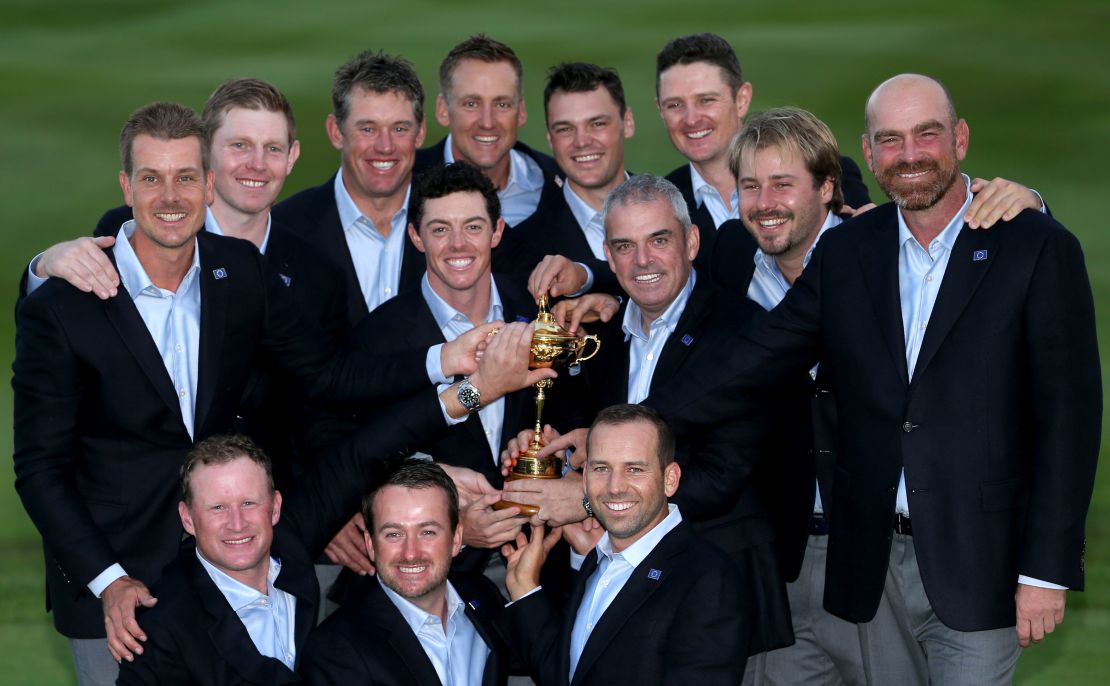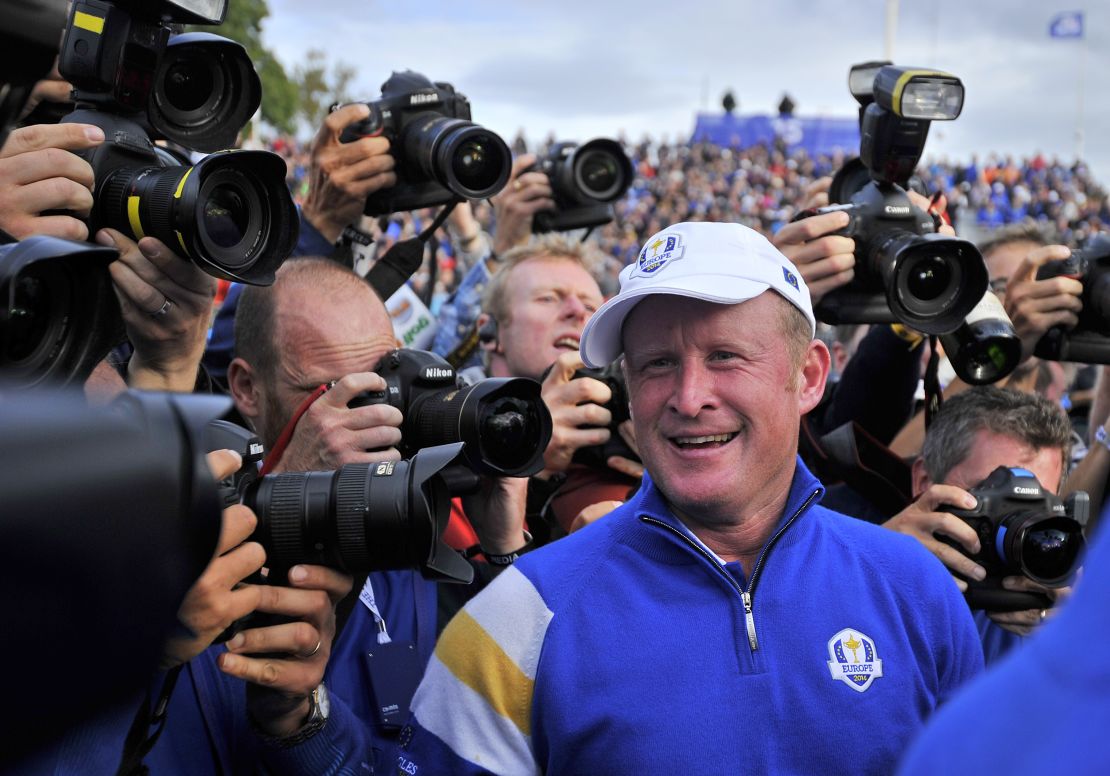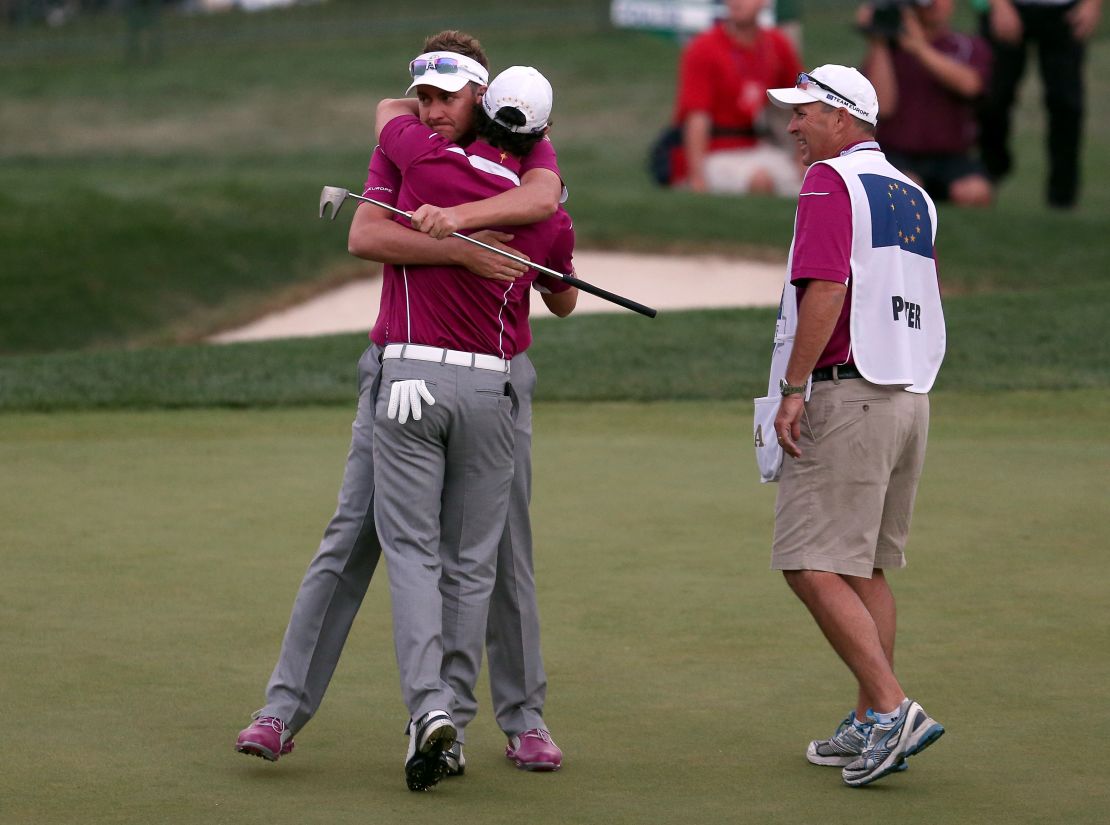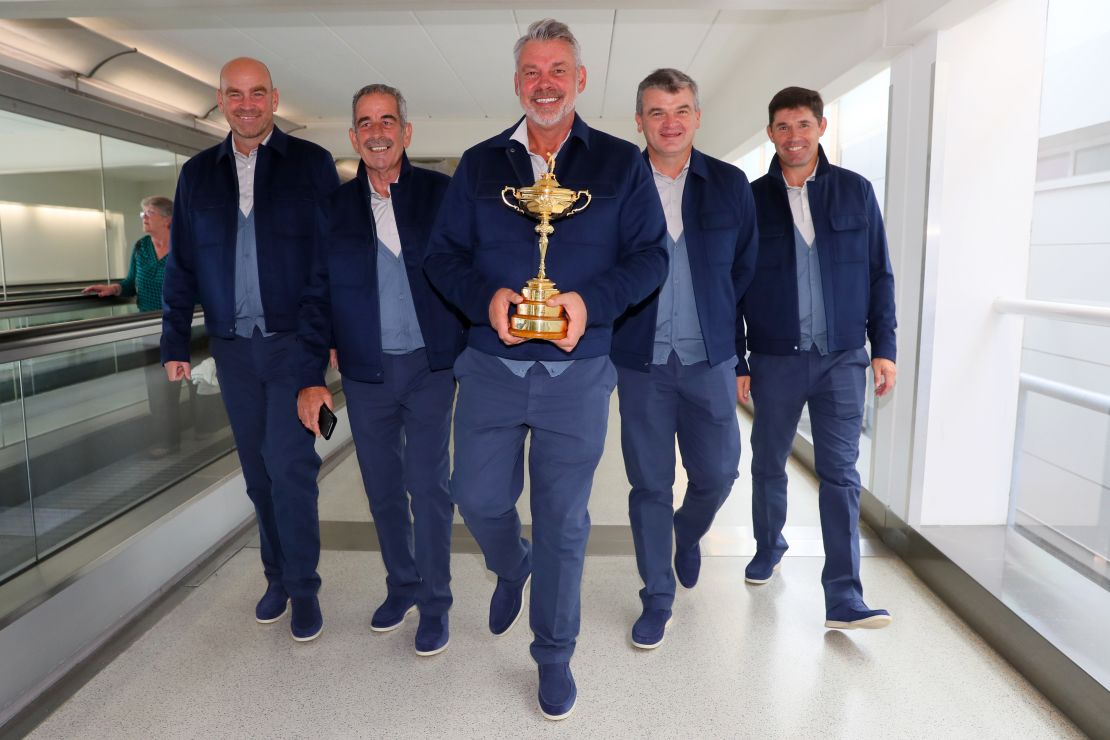Story highlights
Europe brings six data analysts to Ryder Cup
Data can help with pairings and singles order
US player profiles also available
From goldfish in team colors to motivational speeches from inspiring leaders, Ryder Cup captains are always looking for an edge.
But while every captain vows to leave no stone unturned in the pursuit of victory, Europe’s 2016 skipper Darren Clarke has turned to a very modern trend in performance enhancement in business and sport: Data analysis.
Clarke has brought in a team of six data specialists – half the size of his playing squad – who will have every conceivable figure at their fingertips as the Northern Irishman steers Europe’s ship in the biennial matchplay event against the United States, which takes place at Hazeltine, Minnesota, this week.
Europe has won the last three Ryder Cups and eight of the last 10. But despite having Masters champion Danny Willett, British Open champion Henrik Stenson, Olympic gold medalist Justin Rose and overall Fed Ex Cup winner Rory McIlroy, Europe will also field six rookies playing a strong US side away from home. Any advantage, therefore, could be crucial.
READ: Obama, Tiger leads tributes to golf legend Palmer
“We have a big database with lots of information from past Ryder Cups but also how well the Europeans have performed in the last 12 months so we can get a sense of the strengths and weaknesses in different aspects of their game,” Blake Wooster, chief executive of UK data analysis company 15th Club, told CNN.
“Our data enables you to dig a lot deeper, so we’ll go away and crunch those numbers to give Darren the information he needs to make decisions.”
READ: How Arnold Palmer transformed golf
Wooster’s company is an offshoot of 21st Club, an established data consultancy providing soccer clubs with strategic insights, performance analytics, player recruitment and talent development. Use of modern analytical tools is known to have contributed to Leicester City’s remarkable English Premier League triumph last season.
The golfing version began a couple of years ago when an old friend of Wooster’s, Duncan Carey, was the head pro at The Astbury golf course in Shropshire. Clarke was an ambassador for the club and Carey – who now works for 15th Club – made the introductions.
“We showed Darren Clarke what we did in football and he said, ‘We’ve got to have this for the Ryder Cup,’” Wooster said.
Clarke first used their services as captain of the European team at the EurAsia Cup in Malaysia in January. To prepare, he spent Christmas poring over a 48-page report the team had produced, and was lavish in his praise after his side convincingly won 18?-5?.
The 48-year-old said the dossier produced by 15th Club contained “everything you could imagine: the golf course, pairings, performance under pressure, consistency, which order the players should tee-off in, who drives the odds, the evens, the best fourballs, the best foursomes … everything conceivable.”

Deep dive
The data team also works with a number of individual players such as McIlroy and Lee Westwood, and contributed to Willett’s Masters triumph, advising the Englishman and his caddy Jonathan Smart on course strategy, based on historical data and probability.
“Thanks to @15thClub helping me and @Smartie13 prep better for course strategy this week,” Willett tweeted after landing his maiden major title at Augusta in April.

The software developed by 15th Club has already aided Clarke in his team selection, for example, by looking beyond traditional statistics such as world rankings.
As Wooster says, a disproportionate amount of ranking points are awarded for a tournament win compared to the player who missed a putt by fractions of an inch to finish second.
“Traditional statistics aren’t useless, they just don’t go as deep as we would like them to do,” he adds.
READ: Westwood mocks US ‘best ever’ Ryder Cup team claim
The company uses some of the methodology pioneered by American Mark Broadie, a professor at Columbia Business School. Broadie’s book “Every Shot Counts” describes his “strokes gained” approach which has revolutionized golf statistics and is used heavily on the professional circuit.
“To give you an example, two players are on the green the same distance away from the hole,” Wooster says. “The data might show the average number of putts it takes to sink it from there is 1.5.
“Player A holes his putt, and therefore gains half a shot on the field, but the other guy two-putts and loses half a shot.
“When you accumulate all those different types of shots over all the tournaments you are able to understand, for example, if Rory McIlroy is gaining shots relative to the field on driving but maybe losing shots relative to the field on putting.
“So there might be aspects of his game he wants to work on himself, but also Darren Clarke might be interested from a Ryder Cup perspective.”

‘Art as well as science’
Wooster offers another example of two players facing a shot from 100 yards out on a par four. Both reach the green in two – and are therefore said to have reached the green in regulation (leaving two putts for par).
But if the first is 10 feet away and the second is two feet from the pin, the latter is clearly better, yet they both get the same value for the traditional “greens in regulation” statistic.
Who will win the Ryder Cup? Have your say on the CNN Sport Facebook page.
At Hazeltine, Wooster’s team will look to offer Clarke a scientific angle with greater nuance as he decides on his pairings for the Friday/Saturday foursomes and fourballs as well as the 12 singles matches on Sunday.
“Historically, Ryder Cup captains will often put guys together who got on well together or have the same nationality and speak the same language,” Wooster says.
“We support a lot of that and are certainly not obsessed with data. There is an art as well as a science when thinking about this stuff.
“But we try to bring a more objective analytical voice to the room to complement a lot of that experience and knowledge the vice-captains and captain will have from playing the game.
“Hopefully, when you put all those things together you’ll have a pretty balanced view to help make the right decisions.”
Clarke acknowledged in his Captain’s Blog on the Ryder Cup website in May that “stats are massively important” but added that they would be used in conjunction with “gut feeling and knowledge of the players.”

‘Be careful’
The data could also have an input in trying to predict which will be the crucial singles matches and therefore how Clarke selects his team order for Sunday.
“You might pick guys who perform well under pressure, historically, to try to close out those games,” Wooster says.
He cites the example of Europe’s Matthew Fitzpatrick, who the data has identified as being good under pressure based on the occasions he has gone on to win when leading a tournament on the final day rather than buckling.
“Obviously Matt Fitzpatrick has not played at the Ryder Cup before and that’s a whole different ball game, as we all know,” adds Wooster, who has told Clarke not to forget his own judgment, based on the 2011 British Open champion’s 26 years of experience as a professional.
“There is a whole bunch of things you take into account. There’s no silver bullet with any of this stuff.”

Clarke’s Europeans will also be armed with statistics on each of the US players, should they wish to study the opposition in more detail to gain a competitive edge.
“We’ll be profiling all the Americans and all their strengths and weaknesses,” says Wooster.
For more on the 2016 Ryder Cup go to cnn.com/golf
“But you’ve got to be careful with all this stuff. If you try to give them too much information on the opposition they might forget what’s really important, which is those guys playing well.”













